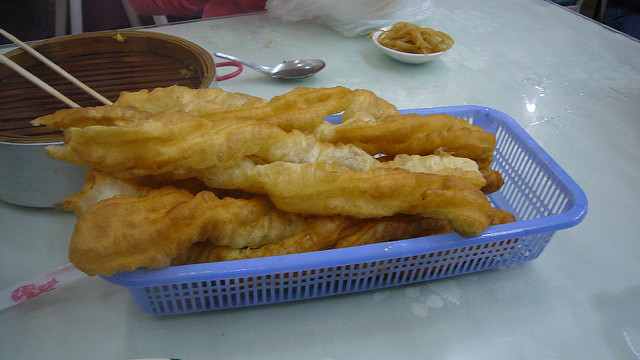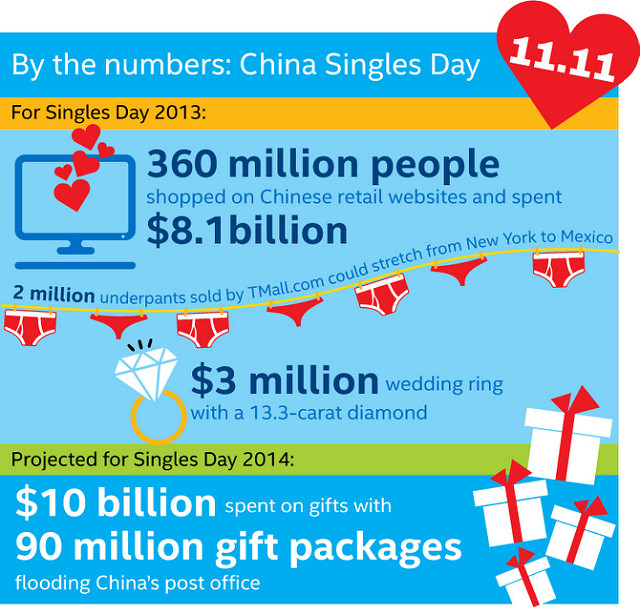Alibaba Breaks Singles’ Day Sales Record Posted by sasha on Nov 15, 2018 in Culture
Singles’ Day (光棍节 – guāng gùn jié), China’s anti-Valentine’s Day, just happened on 11/11. While it started out as a day for single college students to go out to eat together, it has morphed into a massive day for online shopping (网上购物 – wǎng shàng gòu wù). China’s e-commerce giant Alibaba (阿里巴巴 – Ā lǐ bā bā) has cashed in big time on the holiday. Sales on Singles’ Day have steadily risen over the years, with Alibaba once again breaking their Singles’ Day sales record this year. Read on to learn more about the holiday and the massive numbers it put up this year.
Singles’ Day Background
The Chinese name doesn’t actually translate as “Singles’ Day.” It’s better translated as “bare branch festival” – a tree with no leaves representing a person with no better half. Of course, it wouldn’t be a Chinese holiday without some far-fetched legend behind it…
It is said that long ago, on one November 11 evening, four single men were sitting around playing mahjong (麻将 – má jiàng), a very popular Chinese game. On that particular day, the men played from 11 a.m. to 11 p.m. (从上五十一点到晚上十一点 – cóng shàng wǔ shí yī diǎn dào wǎn shàng shí yī diǎn). During their games, no matter who won, the winning card was always the “four columns” card, which shows four independent, parallel columns in two lines, thus resembling the date – 11.11.
For a while, the biggest Singles’ Day tradition was to eat four fried dough sticks (油条 – yóu tiáo) to represent the four ones, and one steamed bun (包子 – bāo zi), to represent the dot in 11.11. In the big cities, bars (酒吧 – jiǔ bā), movie theaters (电影院 – diàn yǐng yuàn), and amusement parks (游乐园 – yóu lè yuán) started to run special deals for the holiday, looking to cash in on the single crowd.
Thanks to the millions of single Chinese, dating TV programs (相亲的界目 – xiāng qīn de jiè mù) and dating websites became incredibly popular. One such website (www.jiayuan.com) holds an annual party for singles. Held on 11.11, 1,111 tickets are sold at the price of 111 RMB each (how do you say overkill in Chinese?)
While movie theaters and dating websites may have made a little bit of money off of the holiday, one savvy businessman saw a much bigger opportunity to cash in on the millions of single people in China. Cue Jack Ma, founder of the Alibaba Group.
Learn a bit about Singles’ Day in this short video.
Alibaba Cashes In
In 2009, Alibaba ran its first Singles’ Day sales event through its e-commerce sites Tmall and Taobao. To promote the sale, they had a very interesting slogan:
就算没有男女朋友,至少我们可以疯狂购物
jiù suàn méi yǒu nán nǚ péng yǒu, zhì shǎo wǒ men kě yǐ fēng kuáng gòu wù
Even if there are no boyfriends or girlfriends, we can still shop like crazy.
The idea for the first Singles’ Day event was simple – offer a half-price discount and free shipping. Many merchants didn’t believe this would be successful and actually backed out. They also didn’t understand the midnight start time, thinking people wouldn’t stay up all night just to shop online. Long story short, they were wrong, and Jack Ma was right. Many of the participating merchants quickly sold out of goods. At the end of the day, sales totaled around $7 million in value. Not bad for a new idea many thought was doomed to fail!
Since that first year, sales on Singles’ Day have been steadily rising year after year. From that respectable $7 million in 2009, it quickly jumped to $135 million the next year. Nobody was prepared for that massive growth, as some customers ended up waiting a few months for goods that would usually take only a few days. Many of the companies involved began moving employees from different departments over to e-commerce to handle the new demand. It was clear that online shopping was the future of commerce in China.
A great piece from Vice News about Singles’ Day.
The Rise of Double 11
The next year, Alibaba actually stopped using the name “Singles’ Day” in their promotion of the 11/11 sale, as they tried to target ALL consumers and not just the single ones. By 2012, the company had trademarked the name “Double 11” (双十一 – shuāng shí yī) to use for the big day. Nobody seemed to mind the change, with the 2012 edition raking in over $3 billion. With those impressive numbers, Double 11 officially surpassed Cyber Monday.
A few years later, and Alibaba got listed on the NYSE after raising $25 billion in what was the largest IPO ever. The Double 11 shopping bonanza came two months after that and was branded as a “global shopping party.” It wasn’t just for single people anymore, nor was it only for Chinese. At the end of the day in 2014, there had been over $9 billion in sales.
Online Shopping Alters the Lexicon
In 2015, Alibaba threw a massive gala event on national TV, inviting celebrities like Daniel Craig and Kobe Bryant. With sales passing $14 billion that year, Double 11 surpassed Black Friday and Cyber Monday combined. It was that year that a few new interesting phrases entered the Chinese lexicon to describe the country’s new obsession with online shopping:
- to grow grass (种草 – zhòng cǎo)
- to eat dirt (吃土 – chī tǔ)
- to chop off your hands (剁手 – duò shǒu)
Basically, “to grow grass” means to plant ideas in one’s mind. All of the advertisements leading up to Double 11 and people talking about what they’re going to buy “grows grass” in your mind and convinces you to buy things. When the big day comes around and you spend all your money, you’re left having “to eat dirt.” Basically, you’re flat broke. That being said, you still want to BUY MORE! As a result, you’ll have “to chop off your hands” in order to stop shopping online.
Alibaba Breaks Records Once Again
Nobody chopped off their hands, though. The Double 11 shopping day continued to grow by huge numbers year after year. With the elimination of the one-child policy and the rise of China’s middle class, people used the big shopping day to pick up things like diapers and double strollers. The top-selling item in 2017 was actually cat food, a sign that the rising middle class in China has fallen in love with keeping pets.
Despite an escalating trade war with the US – which Jack Ma described as “the most stupid thing in this world” – Alibaba still smashed its record once again this year, bringing in $30.8 billion. That’s more than twice the amount of Black Friday and Cyber Monday combined. If there were any doubts about Double 11’s capacity to put up huge numbers during a trade war, they have easily been erased.
Practice your Chinese listening a bit with this video.
Where will the Double 11 shopping holiday go from here? My guess is nowhere but up. With the rise of smartphones and e-pay (which is also run by Alibaba, by the way), coupled with the growing middle class of China (who can now have two children), the sky is the limit.

Build vocabulary, practice pronunciation, and more with Transparent Language Online. Available anytime, anywhere, on any device.






Leave a comment: